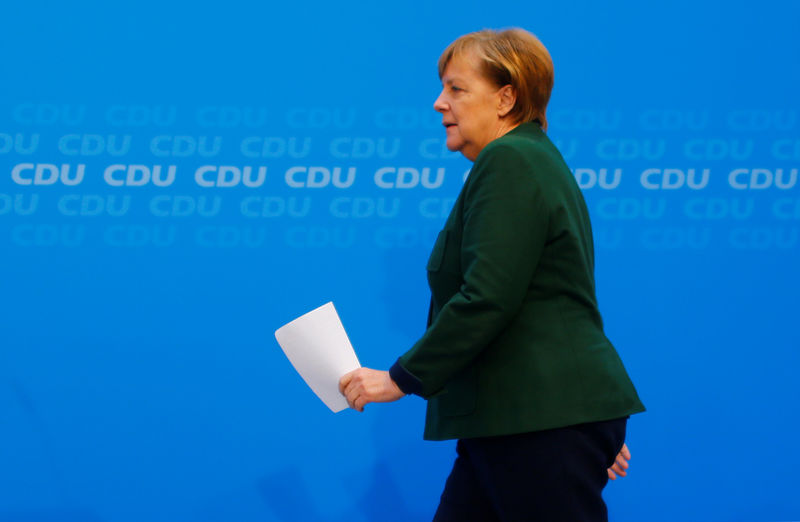By Joseph Nasr
BERLIN (Reuters) - German Chancellor Angela Merkel scolded a minister on Tuesday in a bid to shield talks on forming a coalition government from a dispute between cabinet colleagues over an EU licence for a weedkiller.
Conservative Agriculture Minister Christian Schmidt angered the centre-left SPD on Monday by breaking protocol to back a European Union proposal to extend the use of glyphosate in the bloc for another five years, a measure opposed by the SPD.
The matter is sensitive because only last week the SPD reversed its decision to go into opposition after suffering its worst result in 70 years in a September election. They are expected to launch talks next year with Merkel's conservatives on forming a coalition government.
The SPD are junior partners in Merkel's caretaker government, which includes her Christian Democrats (CDU) and their Bavarian sister party, the Christian Social Union (CSU) of which agriculture minister Schmidt is a member.
"As for the vote of the agriculture ministry yesterday on glyphosate, this did not comply with the instructions worked out by the federal government," Merkel said. "I expect that such an incident will not be repeated."
It is usual practice that Germany abstains in EU votes if ministers from different parties disagree on a policy. Schmidt's decision has strained relations between the two camps before they even launch exploratory talks on renewing their alliance.
"(The chancellor) must do something to heal the loss of trust. You can't govern like that. It simply doesn't work," SPD Environment Minister Barbara Hendricks told Deutschlandfunk radio before Merkel made her comments.
Merkel said even though her stance on glyphosate use was closer to Schmidt's than to Hendricks' he should not have voted in favour against the wish of his colleague and in breach of government instructions.
Hendricks did not say whether the SPD wants Merkel to fire Schmidt, but the ecologist Greens said she should do just that.
"MY DECISION"
Merkel turned to the SPD after failing to form a coalition with the pro-business Free Democrats (FDP) and the Greens, which created an impasse unseen in the post-World War Two era.
Schmidt defended his decision to vote in favour of the five-year extension in Brussels on Monday, saying the European Commission would have probably decided on a longer extension if the vote had been indecisive.
"I took the decision on my own," Schmidt told German public television. "It falls under my responsibility."
Hendricks said she had called Schmidt two hours before the tight vote in Brussels, which Germany tipped in favour of an extension by defeating its key ally France. She expressed her opposition to the continued use of the weedkiller, which some of the EU's 28 member states fear causes cancer.
"Christian Schmidt took the chestnut out of the fire for the Commission in breach of our consultations," Hendricks said.
French President Emmanuel Macron had wanted a shorter extension and a rapid phasing out of glyphosate, which is a mainstay of farming across the continent.

After the vote, he said he would take all necessary measures to ban the product, originally developed by Monsanto (NYSE:MON), as soon as an alternative is available and at the latest within three years. Germany's Bayer (DE:BAYGN) plans to take over Monsanto for $63.5 billion (£48 billion).